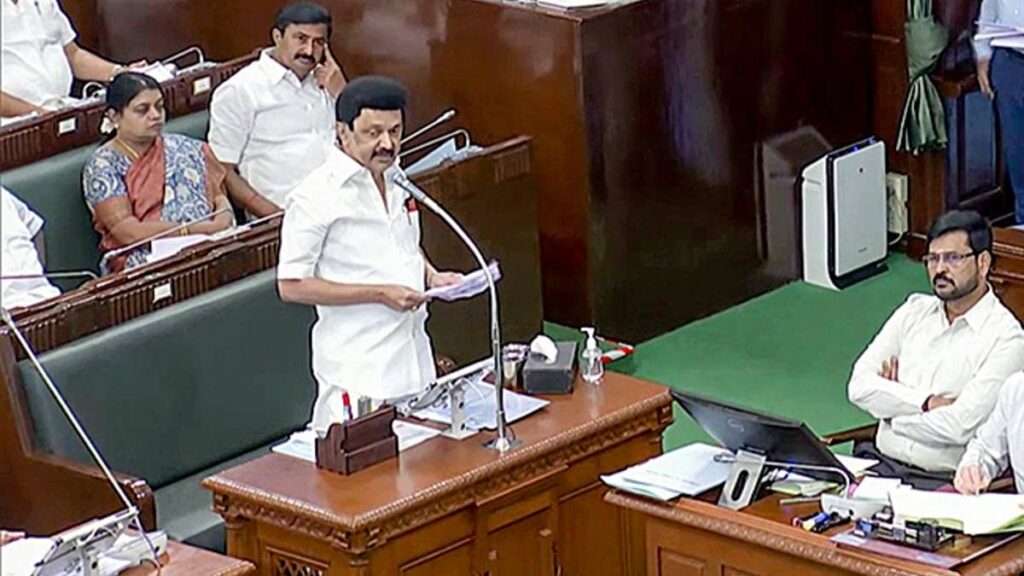Chennai: Tamil Nadu Chief Minister M.K. Stalin announced in the state assembly Thursday that a statue of Karl Marx would be installed in Chennai, celebrating the Communist ideologue’s contributions to workers’ rights and social change. The announcement comes at a time when the Communist Party of India (Marxist)’s 24th congress is under way at Madurai, and the state is due for assembly elections in 2026.
“I believe it is appropriate to install the statue of this genius in Chennai, where the labour movement thrived a hundred years ago,” said Stalin.
He went on to describe Marx as a “global genius” whose ideas reshaped history. “Many are born in history and many have served history, but only a few have changed the course of history. Karl Marx is one among those few celebrated leaders,” Stalin said.
Political analysts in the state believe that the move would help the ruling DMK electorally as it broadens its social and ideological orientation.
“Dravidian social ideology is inclusive and Stalin is broadening the social, economic and political philosophy of Dravidian social and cultural identity. It would help him electorally, because it helps to broaden the social and ideological orientation and build bridges with the Left and socialists in the country,” Ramu Manivannan, former professor and head of the political science department at Madras University, told ThePrint, adding that developments point to the political and ideological position of the DMK before the 2026 assembly election.
Also Read: Who were the first Indians? Research says Dravidians, not Aryans
Left movement and Tamil Nadu
The Dravidian movement has been associated with the Left movement ever since the days of Periyar. According to Dravidian historian K. Thirunavukkarasu, it was social reformer E.V. Ramasamy, fondly called as Periyar, who first translated Marx and Engels’ The Communist Manifesto in Tamil and published it in Tamil Nadu in 1931.
He also said Periyar was contemplating to form the first Left party ‘Then Indhiya Samadharma Katchi’ (South India Equality Party) in the country from 1931 to 1935.
“(Malayapuram) Singaravelar, the first Left leader from South India, has worked closely with Periyar’s self-respect movement and has written articles in Periyar’s Kudi Arasu (a daily run by Periyar) about Left politics. Even Periyar himself was about to start the first Left party but later dropped the idea in 1935,” Thirunavukkarasu told ThePrint.
Malayapuram Singaravelu Chettiar, known as Singaravelar, was recognised as the first communist leader in South India.
In 1918, he founded India’s first labour union in Chennai and on 1 May, 1923, Singaravelar organised India’s first-ever May Day (Labour Day) celebration in the city. At the first Indian communist conference held in Kanpur in 1925, Singaravelar participated and spoke about the eradication of untouchability in Tamil Nadu, according to historians.
In the assembly Thursday, Stalin spoke about how the Dravidian leaders had realised the essence of Marx’s ideas and translated The Communist Manifesto in Tamil as early as 1931.
“Understanding the importance of Karl Marx’s ideas, Thanthai Periyar translated The Communist Manifesto by Marx and Engels into Tamil in 1931 and published it in Tamil Nadu,” he said. Stalin also recalled Marx’s political slogan “workers of the world, unite! You have nothing to lose but your chains”, and said that his ideas laid the foundation for revolutions around the world and led to many social changes.
“His thoughts of ‘everything for everyone’ resonates with our values and that’s why we presented our budget on his memorial day on 14 March,” the CM said, further recalling how Marx observed and wrote about India.
“The place is full of unsolvable contradictions, different governments, various races, clans, castes, religions, but because of its geographical unity, we call it India. But, someday, the country may find renaissance,” Stalin quoted Marx as saying, and added: “At a time when no one wrote about India, Karl Marx wrote about it with great accuracy.”
Memorial for All India Forward Bloc leader
Stalin also announced a memorial for All India Forward Bloc leader P.K. Mookaiah Thevar, a five-time MLA and one-time MP who spoke out in Parliament against the Katchatheevu agreement between India and Sri Lanka.
Born on 4 April, 1923, in Usilampatti of Madurai district, he was one of the confidants of Forward Bloc leader Muthuramalinga Thevar.
In the first election of independent India in 1951-1952, Mookaiah won from Periyakulam constituency in Theni district and continued to win in subsequent assembly elections in 1957, 1962, 1967 and 1977.
Stalin recalled in the assembly how Mookaiah stood by DMK founder C.N. Annadurai in 1967 when the government changed. “At that time, as the temporary speaker of this assembly, he administered the oath to members,” he said.
(Edited by Nida Fatima Siddiqui)
Also Read: Brahmin ignorance, liberal guilt, Karl Marx – Manjeet Sarkar spares none in ‘Untouchable’


